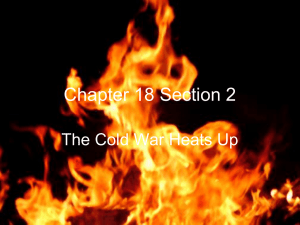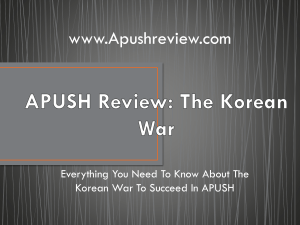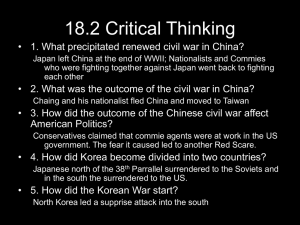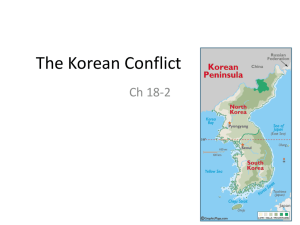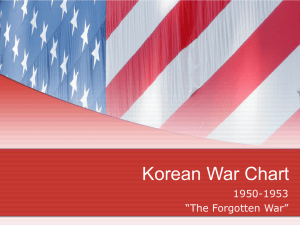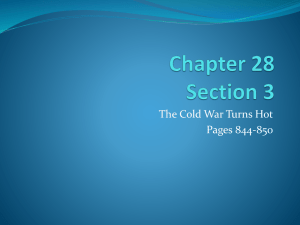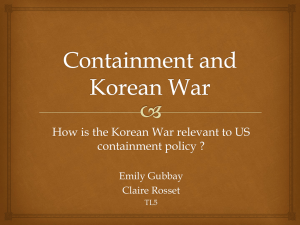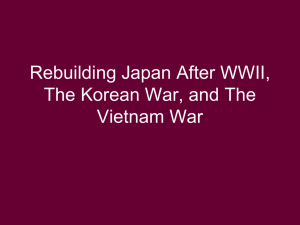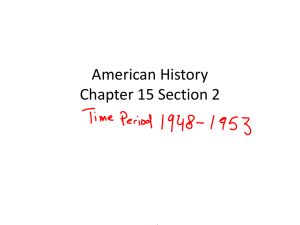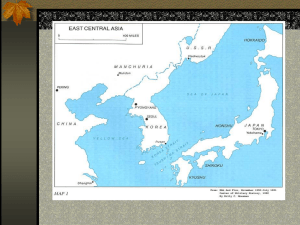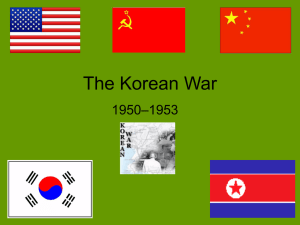Chapter 18 Section 2
advertisement
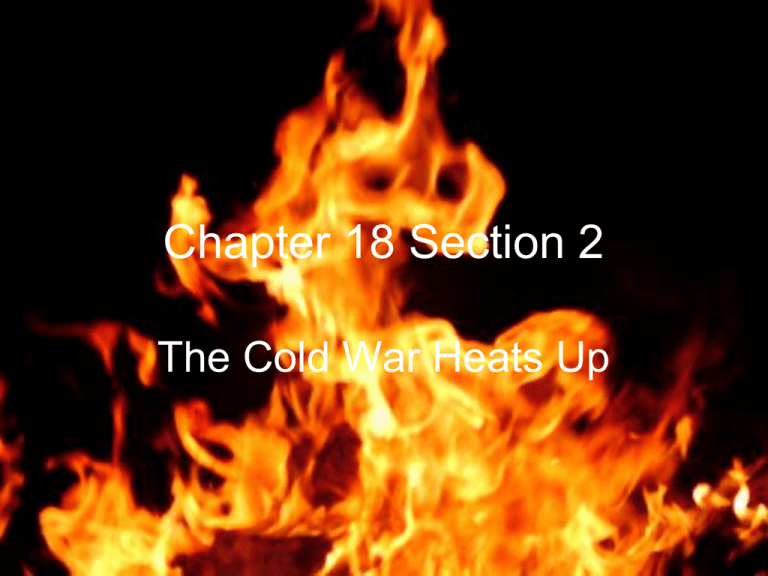
Chapter 18 Section 2 The Cold War Heats Up Civil War in China • During WWII- A Japanese invasion interrupted a long Chinese Civil War • Communists vs. Nationalists • Communist leaderMao Zedong • Nationalist leaderChiang Kai-shek Civil War in China • US begins aiding Nationalists during WWII Civil War in China • US military officials didn’t like Chiang • Found his govmt dictatorial, inefficient, and hopelessly corrupt • Policies of Chiang undermined the Nationalists Civil War in China • collected a grain tax from farmers during a famine • Secret police fired against protesters protesting against a 10,000% increase in the price of rice Civil War in China • Communists skillful in winning support of the peasants • Communists would redistribute land to peasants and reduce rents Fighting Breaks Out • As soon as Japanese left China-civil war resumed • Americans favored the nationalists because they opposed communists • 1944 to 47 US tried to make peacemaker between 2 groupswhile still supporting nationalists Fighting Breaks Out • Truman refused to commit American soldiers • US sent $2 billion worth of military equipment and supplies Fighting Breaks Out • Nationalist problems: – Weak military leadership – Corrupt – Abusive practices drove peasants to the communists Fighting Breaks Out • May 1949- Chiang and the remnants of his govmt and army fled to Taiwan – An island east of mainland China America Reacts to Communist Takeover • American public stunned • Containment failed • Congress attack Truman for not supplying enough aid to Chiang • Shouldn’t containment be important in Asia as well as Europe? America Reacts to Communist Takeover • State Department said the only way to help the Nationalists was to go to war • A war the US wasn’t prepared to fight – Most people accepted this reasoning – Some rejected it as lame excuses America Reacts to Communist Takeover • Many claimed the US “lost” China • Said American govmt was riddled with Communist agents • American fear of Communism grew Koreans go to War • Japan ruled Korea until 1945 • Japanese north of 38th parallel surrendered to Russians • South of 38th parallel surrendered to the US Koreans go to War • 38th parallel not intended as a permanent boundary • 2 different nations emerged-one communist, one not • South Korea becomes Republic of Korea-headed by Syngman Rhee Koreans go to War • North becomes Democratic People’s Republic of Korea • Headed by Kim Il Sung • By 1949- US and Soviets had left Korea • Each govmt claimed sole right to rule all Korea North Korea Attacks South Korea • June 25, 1950 North invades South-Begins Korean War • Americans alarmed that another Asian nation may fall to communism • Truman decides to take military action North Korea Attacks South Korea • June 27, 1950-UN pledges to help South Korea • 16 nations with 520,000 troops assist South Korea – Under command of Douglas MacArthur US Fights in Korea • NK unstoppable at 1st • After 1 month- UN troops forced to small defensive zone around Pusan MacArthur’s Counterattack • MacArthur launches counterattack • Sept 15, 1950 UN troops land at Inchon • Other troops move north from Pusan • North Koreans trapped in the middle MacArthur’s Counterattack • Many NK troops surrendered • Many fled back behind 38th parallel • 10/7/1950- UN recommends MacArthur cross 38th parallel and reunite Korea MacArthur’s Counterattack • China warned that they would not stand by and let the Americans come to the border-the Yalu River • MacArthur dismisses Chinese threat The Chinese Fight Back • 11/25/1950- 300,000 Chinese move into NK • By Christmas, Chinese force UN forces 100 miles south of 38th parallel • 2 more years neither side able to make an advance MacArthur Recommends Attacking China • Calls for extension of war into China-to end the stalemate • Blockade Chinese coast • Use atomic bombs on China • Use Chiang Kai Shek’s troops to invade southern China MacArthur Recommends Attacking China • Truman rejects MacArthur’s request • Didn’t want US involved in a massive land war in Asia • Soviets had a mutual assistance pact with the Chinese – Could set off WWIII MacArthur Recommends Attacking China • Instead of attacking China – UN forces advance against Korean forces • Retake Seoul • Moved back up to the 38th parallel Settling for a Stalemate • Soviets suggest a cease-fire on June 23, 1951 • Truce talks began in July 1951 Settling for a Stalemate • By following Spring, opposing sides agreed on 2 points: • 1. Location of the ceasefire line at the existing battle line • 2. Establish a demilitarized zone between the opposing sides Settling for a Stalemate • July 1953- two sides sign an armistice ending the war • Basically ended in a stalemate American Victory? • Communism contained without a world war • No use of atomic weapons – Although the threat of using them helped break a negotiation deadlock Communist Victory? • North Korea still communist • Still 2 Koreas rather than 1 Effects of Korean War • 54,000 Americans killed • Cost between $20 and $22 billion • High cost of war led to rejection of Democratic party in 1952 – Election of Dwight D. Eisenhower as President – Increased fear of communist aggression – Prompted a hunt for spies
